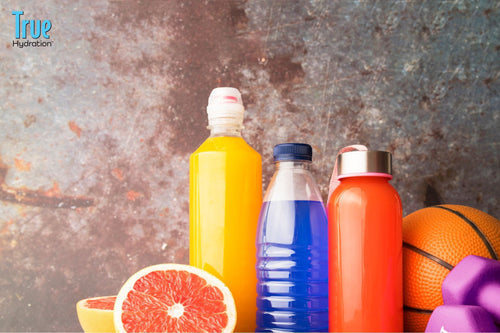Key Takeaways
- Diarrhoea causes rapid fluid and mineral loss, making rehydration an important step in recovery.
- Not all drinks support gentle hydration; some may contain ingredients that burden the digestive system.
- Hypotonic drinks can offer quicker absorption without excess sugar or sodium.
- Choosing the right rehydration drink can support the body’s recovery more effectively and naturally.
Hydration That Supports Recovery
Following an episode of diarrhoea, staying hydrated becomes one of the most important ways to restore your body to good health. Diarrhoea can dehydrate your body quickly, leaving you weak, dizzy, and drained. This is why choosing the right drink for diarrhoea recovery matters. Aside from just the volume of fluid intake, we must also choose the right kind of fluid to ensure optimal hydration.
Due to its familiarity and widespread availability, an isotonic drink is commonly the beverage of choice for people trying to recover from diarrhoea. However, the sugar and sodium levels in thse drinks are generally better suited for intense physical activity rather than for digestive recovery. In contrast, hypotonic drinks are formulated for fast absorption and a gentler experience, offering a practical alternative when your body needs recovery without added stress.¹
What Happens During Diarrhoea: Fluid Loss and Dehydration
Diarrhoea can lead to the rapid loss of water and important electrolytes like potassium and magnesium. These minerals play a role in various bodily functions, and symptoms such as dizziness, low energy, and dry mouth may occur² when they are depleted.
In order to effectively replace these fluids and minerals, what you drink matters.
Hydration Science 101: Isotonic vs Hypotonic Drinks
While consuming isotonic drinks for diarrhoea recovery might intuitively make sense, this isn’t necessarily the case. To understand why, it’s essential to grasp the key differences between an isotonic drink and a hypotonic drink:
An isotonic drink has a similar concentration as human blood, thanks to the addition of things like carbs, proteins, sugar, and salt. These drinks are typically formulated to replenish lost nutrients and minerals during endurance activities.³ However, they may not always be the best match for post-illness recovery.

Hypotonic drinks, by comparison, have a lower concentration than blood due to the reduced amount of nutrients and minerals in them. This allows hypotonic drinks to be absorbed more rapidly into the bloodstream.³ For individuals recovering from diarrhoea, this fast uptake may offer more immediate support, without placing extra demands on the digestive system.
Why Hypotonic Drinks Are the Smarter Choice Post-Diarrhoea
When the digestive system is compromised, drinks that are lighter and simpler in composition can be better suited.
Additionally, hypotonic drinks are absorbed faster than isotonic or hypertonic options.³ Unlike consuming a typical isotonic drink for diarrhoea, turning to hypotonic solutions can help promote quicker replenishment of lost fluids post-diarrhoea.
Finally, some formulas—such as the one found in True Hydration™—are free from artificial ingredients, offering a natural hydration solution that works quietly in the background, without overloading your system.
What to Avoid in Rehydration Drinks
While reaching for a familiar sports drink may seem convenient, it’s worth considering the ingredients. Some electrolyte drinks are designed for high-intensity exertion, and the addition of things like sodium and sugar can contribute to bloating, discomfort, or excessive weight gain. A well-formulated drink designed for diarrhoea recovery should be low in sugar and high in essential electrolytes, promoting adequate replenishment without unnecessary or undesired effects.
Additionally, drinks containing artificial sweeteners or synthetic artificial sweeteners can also irritate the gut. For this reason, it’s helpful to read labels carefully and avoid drinks that are designed for performance rather than recovery.²
What to Look for Instead
Post-diarrhoea hydration should prioritise efficiency and simplicity. Drinks that support your body without overwhelming it can help smooth the path to feeling better.
Look for low-osmolarity drinks for fast absorption.³ Low-sugar and sodium-free drinks that are free from artificial preservatives or colourings are also ideal. Opt for beverages formulated to align with the needs of the body, not athletic output.
True Hydration™ is made with these principles in mind, supporting recovery through hydration. Choosing natural beverages that fit these criteria offers peace of mind when your system is rebalancing. And when combined with home remedies for diarrhoea like rest and easily digestible foods, this approach helps create a more complete recovery routine.
Let Your Body Recover Gently with the Right Hydration
Supporting the body after diarrhoea involves more than drinking any available fluid. Hypotonic drinks offer a suitable option generally made with fewer additives, designed for fast absorption, and better aligned with recovery needs. When your body is working to restore balance to itself, every choice matters.
If you’re looking for sugar-free hydration drinks that work in tandem with your body’s natural functions, True Hydration™ offers an approach that prioritises natural, balanced support.
Explore your options at True Hydration™ and rehydrate the mindful way.
References:
-
Maughan, R. J., & Shirreffs, S. M. (2008). Development of individual hydration strategies for athletes. International Journal of Sport Nutrition and Exercise Metabolism, 18(5), 457–472. https://doi.org/10.1123/ijsnem.18.5.457
-
World Health Organization. (2005). The treatment of diarrhoea: A manual for physicians and other senior health workers (4th rev.). https://apps.who.int/iris/handle/10665/43209
-
Leiper, J. B. (1998)https://apps.who.int/iris/handle/10665/43209. Gastrointestinal function and endurance exercise: impact of training and nutrition. British Journal of Sports Medicine, 32(4), 241–244. https://doi.org/10.1136/bjsm.32.4.241


